《新概念英语》第一册117-118课课文重难点详解
新概念英语第一册自学笔记含课后练习答案:Lesson 117-118
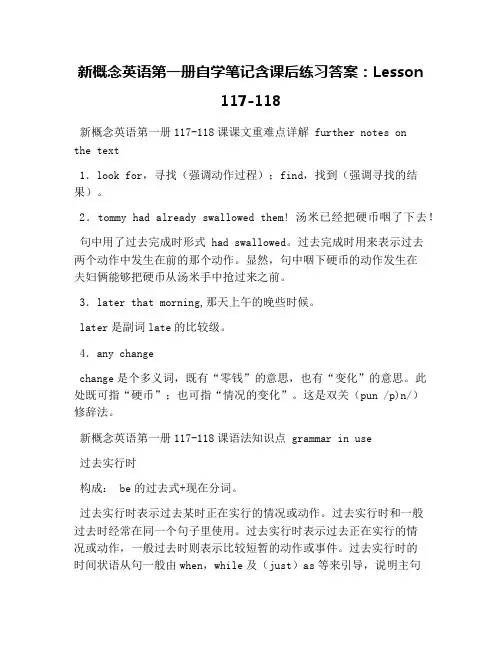
新概念英语第一册自学笔记含课后练习答案:Lesson117-118新概念英语第一册117-118课课文重难点详解 further notes onthe text1.look for,寻找(强调动作过程);find,找到(强调寻找的结果)。
2.tommy had already swallowed them! 汤米已经把硬币咽了下去!句中用了过去完成时形式 had swallowed。
过去完成时用来表示过去两个动作中发生在前的那个动作。
显然,句中咽下硬币的动作发生在夫妇俩能够把硬币从汤米手中抢过来之前。
3.later that morning,那天上午的晚些时候。
later是副词late的比较级。
4.any changechange是个多义词,既有“零钱”的意思,也有“变化”的意思。
此处既可指“硬币”;也可指“情况的变化”。
这是双关(pun /p)n/)修辞法。
新概念英语第一册117-118课语法知识点 grammar in use过去实行时构成: be的过去式+现在分词。
过去实行时表示过去某时正在实行的情况或动作。
过去实行时和一般过去时经常在同一个句子里使用。
过去实行时表示过去正在实行的情况或动作,一般过去时则表示比较短暂的动作或事件。
过去实行时的时间状语从句一般由when,while及(just)as等来引导,说明主句中动作发生时的背景。
此外,可用 while或 at the time等强调同时实行的两种或几种动作。
请看例句:when i was doing the housework, my husband telephoned mefrom the office.当我正在干家务时,我丈夫从办公室打电话给我。
while i was listening to the stereo, my mother came into the room.我正在听立体声节目时,我母亲进房间了。
just as she was cleaning her shoes, george knocked at the door.她正在擦鞋时,乔治敲门了。
新概念英语第一册笔记新版:第40讲(117-118)
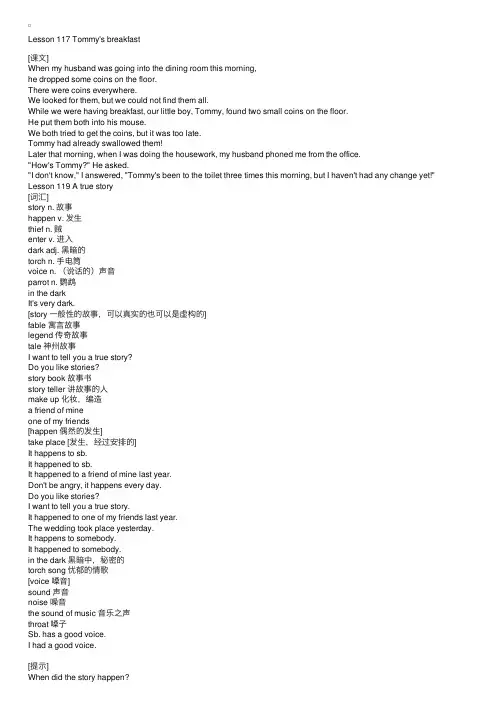
Lesson 117 Tommy's breakfast[课⽂]When my husband was going into the dining room this morning,he dropped some coins on the floor.There were coins everywhere.We looked for them, but we could not find them all.While we were having breakfast, our little boy, Tommy, found two small coins on the floor.He put them both into his mouse.We both tried to get the coins, but it was too late.Tommy had already swallowed them!Later that morning, when I was doing the housework, my husband phoned me from the office."How's Tommy?" He asked."I don't know," I answered, "Tommy's been to the toilet three times this morning, but I haven't had any change yet!" Lesson 119 A true story[词汇]story n. 故事happen v. 发⽣thief n. 贼enter v. 进⼊dark adj. ⿊暗的torch n. ⼿电筒voice n. (说话的)声⾳parrot n. 鹦鹉in the darkIt's very dark.[story ⼀般性的故事,可以真实的也可以是虚构的]fable 寓⾔故事legend 传奇故事tale 神州故事I want to tell you a true story?Do you like stories?story book 故事书story teller 讲故事的⼈make up 化妆,编造a friend of mineone of my friends[happen 偶然的发⽣]take place [发⽣,经过安排的]It happens to sb.It happened to sb.It happened to a friend of mine last year.Don't be angry, it happens every day.Do you like stories?I want to tell you a true story.It happened to one of my friends last year.The wedding took place yesterday.It happens to somebody.It happened to somebody.in the dark ⿊暗中,秘密的torch song 忧郁的情歌[voice 嗓⾳]sound 声⾳noise 噪⾳the sound of music ⾳乐之声throat 嗓⼦Sb. has a good voice.I had a good voice.[提⽰]When did the story happen?Who did the story happen to?Who is George?When the story happened, what was George doing?Do you like stories?I want to tell you a true story.It happened to a friend of mine a year ago.While my friend, George, was reading in bed, tow thieves climbed into his kitchen. After they had entered the house, they went into the dining room.It was very dark, so they turned on a torch.Suddenly, they heard a voice behind them."What's up? What's up?" Someone called.Two thieves went into the dining room after they had entered the house. It was very dark. The thieves turned on the torch.Suddenly, they heard a voice behind them."What's up? What's up?" someone called.The thieves dropped the torch and ran away as quickly as they could.George heard the noise and came downstairs quickly.He turned on the light, but he couldn't see anyone.George saw the parrot.What did the parrot say?"What's up, George?" he called.How did George answer?"Nothing, Henry," George said and smiled. "Go back to sleep."George heard the noise and came downstairs quickly.He turned on the light, but he couldn't see anyone.But George's parrot, Henry, was still there."What's up, George?" he called."Nothing, Henry," George said and smiled. "Go back to sleep."[课⽂]Do you like stories? I want to tell you a true story.It happened to a friend of mine a year ago.While my friend, George, was reading in bed, two thieves climbed into his kitchen. After they had entered the house, they went into the dining room.It was very dark, so they turned on a torch.Suddenly, they heard a voice behind them."What's up? What's up?" someone called.The thieves dropped the torch and ran away as quickly as they could.George heard the noise and came downstairs quickly.He turned on the light, but he couldn't see anyone.The thieves had already gone.But George's parrot, Henry, was still there."What's up, George?" He called."Nothing, Henry," George said and smiled. "Go back to sleep."I will help you as possible as I can.I will love you as much as I can.Lesson 121 The man in a hat[词汇]customer n. 顾客forget v. 忘记manager n. 经理serve v. 照应,服务,接待counter n. 柜台recognize v. 认出forget -> forgot -> forgottenon the counterThis is something (that) I must decide about.This is something about which I must decide.forget to do sth. 忘记去做某事forget doing sth. 忘记做了某事I have forgotten to bring my book.I will never forget finding that rare coin in my garden.take sth. with sb.I bought a book yesterday.But I forgot to take it with me.expensive 昂贵的dictionary 字典half an hour agoI bought two expensive dictionaries here half an hour ago. But I forgot to take them with me.Who served you?The lady served me.The lady is standing behind the counter.The lady (who is) standing behind the counter served me.Which books did you buy?I bought the books.The books are on the counter.I bought the books which are on the counter.gentleman 绅⼠Did you serve this gentleman half an hour ago?He is the man.The man bought these books.He is the man who bought these books.He says he is the man who bought these books.I can't remember.I served the man.The man who I served was wearing a hat.This is the man.You served the man.This is the man who you served.Is this the man who you served?[课⽂]I bought two expensive dictionaries here half an hour ago, but I forgot to take them with me.Who served you, sir?The lady who is standing behind the counter.Which books did you buy?The books which are on the counter.Did you serve this gentleman half an hour ago, Caroline?He says he's the man who bought these books.I can't remember.The man who I served was wearing a hat.Have you got a hat, sir?Yes, I have.Would you put it on, please?All right.Is this the man that you served, Caroline?Yes. I recognize him now.定语从句:beautiful flowera book on the deskI saw the boy yesterday.This is the boy.This is the boy I saw yesterday.I have a sister.She lives in Paris.I have a sister who lives in Paris.关系代词的功能:1 连接主句和从句2 在从句中做句⼦成分。
新概念英语第一册第117-118课重点语法
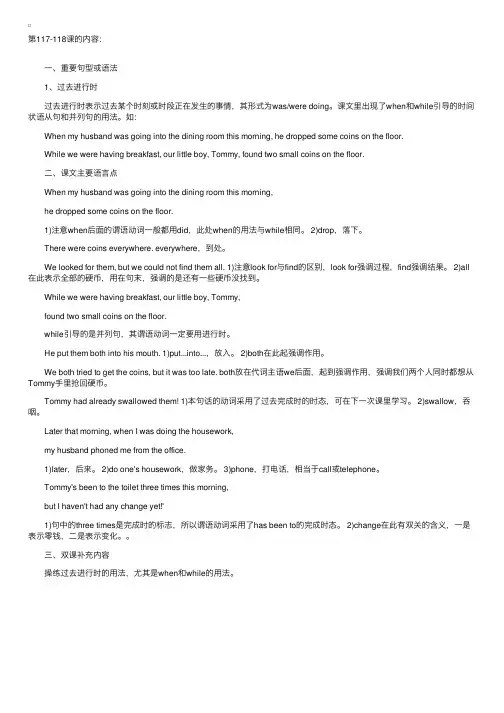
第117-118课的内容: ⼀、重要句型或语法 1、过去进⾏时 过去进⾏时表⽰过去某个时刻或时段正在发⽣的事情,其形式为was/were doing。
课⽂⾥出现了when和while引导的时间状语从句和并列句的⽤法。
如: When my husband was going into the dining room this morning, he dropped some coins on the floor. While we were having breakfast, our little boy, Tommy, found two small coins on the floor. ⼆、课⽂主要语⾔点 When my husband was going into the dining room this morning, he dropped some coins on the floor. 1)注意when后⾯的谓语动词⼀般都⽤did,此处when的⽤法与while相同。
2)drop,落下。
There were coins everywhere. everywhere,到处。
We looked for them, but we could not find them all. 1)注意look for与find的区别,look for强调过程,find强调结果。
2)all 在此表⽰全部的硬币,⽤在句末,强调的是还有⼀些硬币没找到。
While we were having breakfast, our little boy, Tommy, found two small coins on the floor. while引导的是并列句,其谓语动词⼀定要⽤进⾏时。
He put them both into his mouth. 1)put...into...,放⼊。
2)both在此起强调作⽤。
新概念英语第一册第117-118课-Tommy’s breakfast
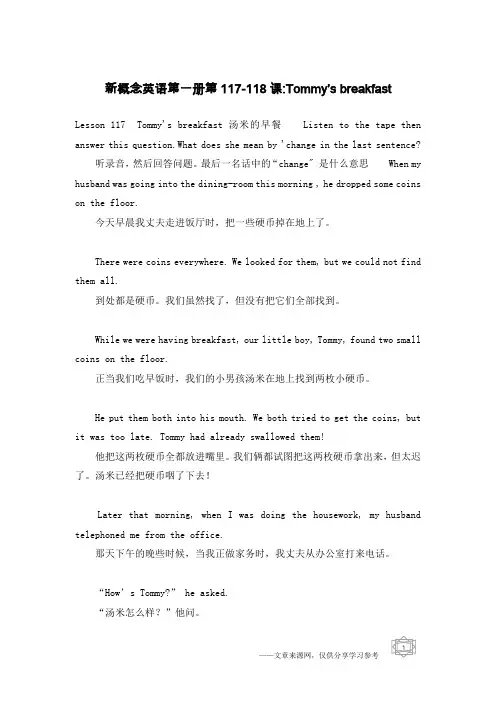
新概念英语第一册第117-118课:Tommy’s breakfastLesson 117 Tommy's breakfast汤米的早餐Listen to the tape then answer this question.What does she mean by 'change in the last sentence?听录音,然后回答问题。
最后一名话中的“change" 是什么意思When my husband was going into the dining-room this morning , he dropped some coins on the floor.今天早晨我丈夫走进饭厅时,把一些硬币掉在地上了。
There were coins everywhere. We looked for them, but we could not find them all.到处都是硬币。
我们虽然找了,但没有把它们全部找到。
While we were having breakfast, our little boy, Tommy, found two small coins on the floor.正当我们吃早饭时,我们的小男孩汤米在地上找到两枚小硬币。
He put them both into his mouth. We both tried to get the coins, but it was too late. Tommy had already swallowed them!他把这两枚硬币全都放进嘴里。
我们俩都试图把这两枚硬币拿出来,但太迟了。
汤米已经把硬币咽了下去!Later that morning, when I was doing the housework, my husband telephoned me from the office.那天下午的晚些时候,当我正做家务时,我丈夫从办公室打来电话。
新概念英语1-Lesson117-118
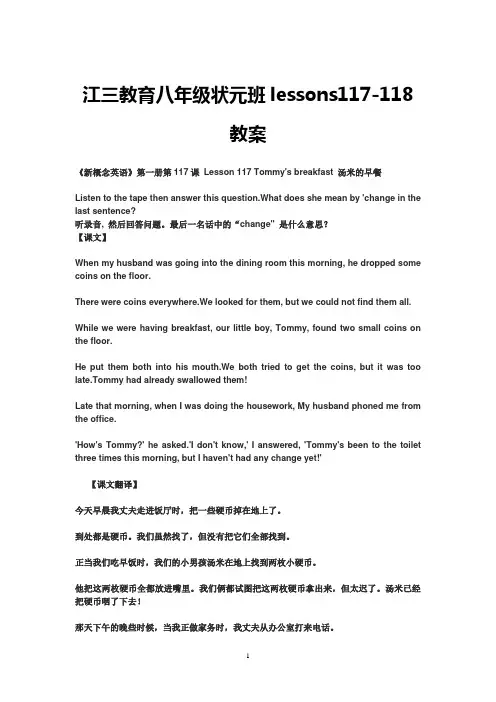
江三教育八年级状元班lessons117-118教案《新概念英语》第一册第117课Lesson 117 Tommy's breakfast 汤米的早餐Listen to the tape then answer this question.What does she mean by 'change in the last sentence?听录音, 然后回答问题。
最后一名话中的“change" 是什么意思?【课文】When my husband was going into the dining room this morning, he dropped some coins on the floor.There were coins everywhere.We looked for them, but we could not find them all.While we were having breakfast, our little boy, Tommy, found two small coins on the floor.He put them both into his mouth.We both tried to get the coins, but it was too late.Tommy had already swallowed them!Late that morning, when I was doing the housework, My husband phoned me from the office.'How's Tommy?' he asked.'I don't know,' I answered, 'Tommy's been to the toilet three times this morning, but I haven't had any change yet!'【课文翻译】今天早晨我丈夫走进饭厅时,把一些硬币掉在地上了。
新概念一117,118知识点整理
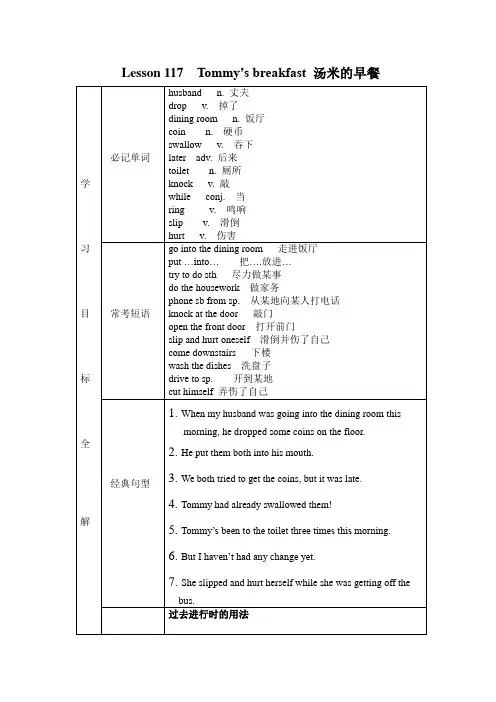
Lesson 117 Tommy’s breakfast 汤米的早餐学习目标全解必记单词husband n. 丈夫drop v. 掉了dining room n. 饭厅coin n. 硬币swallow v. 吞下later adv. 后来toilet n. 厕所knock v. 敲while conj. 当ring v. 鸣响slip v. 滑倒hurt v. 伤害常考短语go into the dining room 走进饭厅put …into…把….放进…try to do sth 尽力做某事do the housework 做家务phone sb from sp. 从某地向某人打电话knock at the door 敲门open the front door 打开前门slip and hurt oneself 滑倒并伤了自己come downstairs 下楼wash the dishes 洗盘子drive to sp. 开到某地cut himself 弄伤了自己经典句型1.When my husband was going into the dining room thismorning, he dropped some coins on the floor.2.He put them both into his mouth.3.We both tried to get the coins, but it was late.4.Tommy had already swallowed them!5.Tommy’s been to the toilet three times this morning.6.But I haven’t had any change yet.7.She slipped and hurt herself while she was getting off thebus.过去进行时的用法重点语法定义:表示过去某一时刻或者某个时间正在进行的动作。
新概念lesson117-lesson118讲义
新概念lesson117-118讲义过去进行时表示过去某一时刻或者某段时间正在进行或发生的动作,常和表过去的时间状语连用,如:I was doing my homework at this time yesterday.昨天的这个时候我正在做作业。
They were waiting for you yesterday.他们昨天一直在等你。
过去进行时的构成:肯定形式:主语+was/were+V-ing否定形式:主语+was not (wasn't)/were not (weren't)+V-ing疑问形式:Was/Were+主语+V-ing。
基本用法:1.过去进行时表示过去某一段时间或某一时刻正在进行的动作。
常与之连用的时间状语有,at that time/moment, (at) this time yesterday (last night/Sunday/week…), at+点钟+yesterday (last night / Sunday…),when sb. did sth等时间状语从句,如:What were you doing at 7p.m. yesterday? 昨天晚上七点你在干什么?I first met Mary three years ago. She was working at a radio shop at the time. 我第一次遇到玛丽是在三年前,当时她在一家无线电商店工作。
I was cooking when she knocked at the door. 她敲门时我正在做饭。
2. when后通常用表示暂短性动词,while后通常用表示持续性动词,因此它所引导的状语从句中,谓语动词常用进行时态,如:When the car exploded I was walking past it.= WhileI was walking past the car it exploded.3.when用作并列连词时,主句常用进行时态,从句则用一般过去时,表示主句动作发生的过程中,另一个意想不到的动作发生了。
新概念第一册第117-118课重点知识
Lesson 117-118 When my husband was going into the dining room this morning, he dropped some coins on the floor.当早上我的丈夫正走进餐厅的时候,他把一些硬币掉在地上了。
这句话注意前半句是过去进行时。
There were coins everywhere.到处都是硬币。
Look for寻找---find 找到,we could not find them all.我们找不到全部硬币。
While we were having breakfast, our little boy found two small coins on the floor.当我们正在吃早饭的时候,我们的小儿子在地上找到了两枚小硬币。
He put them both into his mouth.他把两枚硬币都放进了嘴巴里。
all三者以上都,both两者都,We both tried to get the coins but it was too late.我们俩都试图把两枚硬币都拿出来但为时已晚。
swallow吞咽When I was doing the housework, my husband phoned me from the office.当我正在做家务的时候,我丈夫从办公室打电话给我。
Tommy has been to the toilet three times this morning.Tommy早上已经去厕所三次了。
But I haven't had any change yet.但是我仍然没有找到硬币。
《新概念英语》第一册117-118课课文重难点详解
《新概念英语》第一册117-118课课文重难点详解117-118课重难点详解Grammar 过去进行时一、过去进行时表示在过去某一时刻或某一段时间内正在进行或发生的动作。
二、常与表示过去的时间状语连用,如:this morni ng,the whole morni ng,allday,yesterday,from nine to ten last evening ,at that time 等;或者与when, while, as引导的过去时间状语连用。
三、构成1. 过去进行时的肯定式:主语+was/were + 动词的现在分词2. 过去进行时的否定式:主语+was/were not + 动词的现在分词3. 过去进行时的疑问式:Was/Were + 主语+动词的现在分词肯定句:We were havi ng supper whe n the pho ne rang. 我们正在吃晚饭时电话响了。
否定句:We were not havi ng supper whe n the phone rang.一般疑问句:Were you hav ing supper whe n the phone rang Yes, I was./ No, I was n't.WhenI was doing the housework, my husband telephoned mefrom the office. 当我正在干家务时,我丈夫从办公室打电话给我。
While I was listening to the stereo, my mother came into the room.我正在听立体声节目时,我母亲进房间了。
Just as she was clea ning her shoes, George kno eked at the door.她正在擦鞋时,乔治敲门了。
While I was cooking the dinner ,he was worki ng in the garde n.我做饭时,他正在花园里劳作词汇学习Word study (读背P238课文注释)1. swallow v. (1)吞下,咽下:Tommy had swallowed the coins. 汤米把硬币吞下去了。
新概念英语第一册Lesson-117-118
Lesson 117 - Tommy’s breakfast & Lesson 118 - What were you doing?知识点:1、When my husband was going into the dining room this morning, he dropped some coins on the floor.句型:当某事发生的时候,发生了某事。
用when引导的时间状语从句。
过去进行时:强调在过去某个时间正在发生的事。
was/were + doing2、There were coins everywhere.【回顾Lesson 115】复合不定代词。
3、We looked for them, but we could not find them all.look for 寻找,强调动作。
look是不及物动词。
find 找到,强调结果。
find是及物动词。
例句:He looked for his pen everywhere, but he couldn’t find it.这里的all放在代词them的后面,作them的同位语,补充说明。
them all = all of them 同位语用来表示其具体内容。
例句:We all like this movie. = All of us like this movie.4、While we were having breakfast, our little boy, Tommy, found two small coins on the floor. 句型:在某事发生的同时,发生了某事。
用while引导的时间状语从句。
例句:While my father was watching TV, my mother was cooking这里的, Tommy, 是our little boy的同位语,补充说明。
5、He put them both into his mouth.both 两者都。
- 1、下载文档前请自行甄别文档内容的完整性,平台不提供额外的编辑、内容补充、找答案等附加服务。
- 2、"仅部分预览"的文档,不可在线预览部分如存在完整性等问题,可反馈申请退款(可完整预览的文档不适用该条件!)。
- 3、如文档侵犯您的权益,请联系客服反馈,我们会尽快为您处理(人工客服工作时间:9:00-18:30)。
117-118课重难点详解
Grammar过去进行时
一、过去进行时表示在过去某一时刻或某一段时间内正在进行或发生的动作。
二、常与表示过去的时间状语连用,如:this morning,the whole morning,all day,yesterday,from nine to ten last evening,at that time等;或者与when, while, as引导的过去时间状语连用。
三、构成
1. 过去进行时的肯定式:
主语+was/were + 动词的现在分词
2. 过去进行时的否定式:
主语+was/were not +动词的现在分词
3. 过去进行时的疑问式:
Was/Were + 主语+ 动词的现在分词?
肯定句:We were having supper when the phone rang. 我们正在吃晚饭时电话响了。
否定句:We were not having supper when the phone rang.
一般疑问句:Were you having supper when the phone rang?
Yes, I was./ No, I wasn't.
When I was doing the housework, my husband telephoned me from the office.当我正在干家务时,我丈夫从办公室打电话给我。
While I was listening to the stereo, my mother came into the room.
我正在听立体声节目时,我母亲进房间了。
Just as she was cleaning her shoes, George knocked at the door.
她正在擦鞋时,乔治敲门了。
While I was cooking the dinner ,he was working in the garden.
我做饭时,他正在花园里劳作
词汇学习Word study(读背P238课文注释)1.swallow v.(1)吞下,咽下:
Tommy had swallowed the coins.汤米把硬币吞下去了。
(2)抑制,使不流露:I tried hard to swallow my doubts.我强忍着不露出怀疑的神色。
She swallowed a smile and sat there still.她忍住没笑,静静地坐在那里。
(3)吞并;侵吞:
Our company was swallowed up by an American company last year.
我们公司去年被一家美国公司吞并了。
2.ring v.
(1)鸣响;发出清脆的响声:
When I was opening the front door, the telephone rang.
我正开前门时,电话铃响了。
Yesterday morning, my alarm clock didn't ring at 7 o'clock as usual.
昨天早上,我的闹钟没像往常那样在7点钟闹。
(2)打电话;按铃:
You said you were going to ring me last night, but you didn't.
你说过你昨晚会给我打电话的,然而你并没有打。
Somebody is ringing the doorbell.
有人在按门铃。
3.look for,寻找(强调动作过程);find,找到(强调寻找的结果)。
新概念英语第一册118课课后练习答案Key to written exercises
Lesson 118
A
1 He knocked at the door when I was answering the phone.
2 He came downstairs when I was having breakfast.
3 The phone rang when I was washing the dishes.
4 The boss arrived when she was typing a letter.
5 The train left when I was buying the tickets.
6 It rained heavily when I was driving to London.
B
1 When he arrived I was cooking a meal.
2 When he arrived I was washing the dishes.
3 When he arrived I was working in the garden.
4 When he arrived I was typing letters.
5 When he arrived I was shaving.
6 When he arrived I was boiling the milk.
7 When he arrived I was phoning my sister.
8 When he arrived I was dusting the bedroom.
C
1 While I was cooking the dinner, he was having a wash.
2 While I was cooking the dinner ,he was watching television.
3 While I was cooking the dinner, he was cleaning his shoes.
4 While I was cooking the dinner, he was listening to the radio.
5 While I was cooking the dinner, he was changing his suit.
6 While I was cooking the dinner, he was sitting in the dining room.
7 While I was cooking the dinner, he was reading the paper.
8 While I was cooking the dinner, he was driving home from work.。
